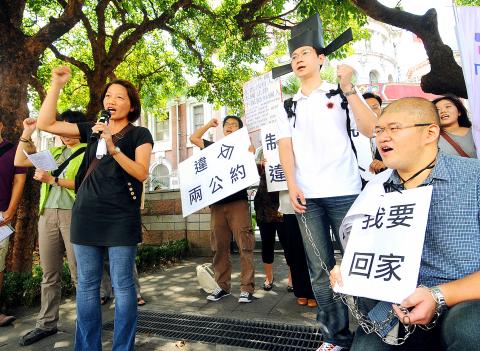Several civic groups yesterday called on the Control Yuan to look into dozens of cases of prolonged pretrial detention of foreigners and to reprimand government agencies for negligence of duty.
Holding various posters, including one that read: “Foreigners in Taiwan are not granted human rights as they are outside the protection of the law,” the groups urged the government watchdog to address the system that discriminates against aliens.
The Taiwan Association for Human Rights (TAHR) said that at the Taipei detention center alone — one of four centers nationwide that hold foreign nationals — dozens of aliens have been detained for more than 120 days even though they have not received sentences exceeding three months.

Photo: Fang Pin-chao, Taipei Times
“Infringement of the liberty of aliens like this is an urgent matter that needs to be resolved,” TAHR secretary-general Tsai Chi-hsun (蔡季勳) said.
The groups said the longstanding problem rested with the National Immigration Agency (NIA), prosecutors’ offices and courts that have procrastinated over holding trials involving detained aliens, as well as the Ministry of Justice and the Judicial Yuan, which have failed to address the human rights violations.
As an example, the groups said authorities detained two Thai migrant workers who were listed as witnesses in a human-trafficking case against employers, for expired visas, for 11 months from September last year.
“The Taiwanese government has been boasting that Taiwan has been given first-class status by the US Department of State in combating human trafficking for two consecutive years. However, is this really how a first-class country treats an alien in detention?” Tsai asked.
In a letter presented to the Control Yuan, the TAHR said that several aliens held at the Taipei detention center for between five and 14 months were detained in connection with crimes in six cases that were all summary offenses, but the Taoyuan District Court had refused to begin their trials.
“The NIA, prosecutors and the court all deserve to be censured,” Tsai said.
Extension of detention is based on Article 38 of the Immigration Act (入出國及移民法), which stipulates that detention shall not exceed 60 days, but if necessary, the NIA could prolong the period until the alien is deported.
“The Ministry of Justice and the Judicial Yuan have turned a deaf ear to our requests to examine the constitutionality of the article,” Tsai said.
The government has taken the lead in infringing human rights by violating the non-discrimination principle enshrined in the International Covenant on Civil and Political Rights that freedom of liberty, movement and a fair trial are rights enjoyed by everyone regardless of nationality, the groups said.
The government must offer compensation for illegal detention to affected aliens in accordance with the Criminal Compensation Act (刑事補償法), they said.

The Taiwanese passport ranked 33rd in a global listing of passports by convenience this month, rising three places from last month’s ranking, but matching its position in January last year. The Henley Passport Index, an international ranking of passports by the number of designations its holder can travel to without a visa, showed that the Taiwan passport enables holders to travel to 139 countries and territories without a visa. Singapore’s passport was ranked the most powerful with visa-free access to 192 destinations out of 227, according to the index published on Tuesday by UK-based migration investment consultancy firm Henley and Partners. Japan’s and

NATIONAL SECURITY THREAT: An official said that Guan Guan’s comments had gone beyond the threshold of free speech, as she advocated for the destruction of the ROC China-born media influencer Guan Guan’s (關關) residency permit has been revoked for repeatedly posting pro-China content that threatens national security, the National Immigration Agency said yesterday. Guan Guan has said many controversial things in her videos posted to Douyin (抖音), including “the red flag will soon be painted all over Taiwan” and “Taiwan is an inseparable part of China,” while expressing hope for expedited “reunification.” The agency received multiple reports alleging that Guan Guan had advocated for armed reunification last year. After investigating, the agency last month issued a notice requiring her to appear and account for her actions. Guan Guan appeared as required,

Japan and the Philippines yesterday signed a defense pact that would allow the tax-free provision of ammunition, fuel, food and other necessities when their forces stage joint training to boost deterrence against China’s growing aggression in the region and to bolster their preparation for natural disasters. Japan has faced increasing political, trade and security tensions with China, which was angered by Japanese Prime Minister Sanae Takaichi’s remark that a Chinese attack on Taiwan would be a survival-threatening situation for Japan, triggering a military response. Japan and the Philippines have also had separate territorial conflicts with Beijing in the East and South China

A strong cold air mass is expected to arrive tonight, bringing a change in weather and a drop in temperature, the Central Weather Administration (CWA) said. The coldest time would be early on Thursday morning, with temperatures in some areas dipping as low as 8°C, it said. Daytime highs yesterday were 22°C to 24°C in northern and eastern Taiwan, and about 25°C to 28°C in the central and southern regions, it said. However, nighttime lows would dip to about 15°C to 16°C in central and northern Taiwan as well as the northeast, and 17°C to 19°C elsewhere, it said. Tropical Storm Nokaen, currently